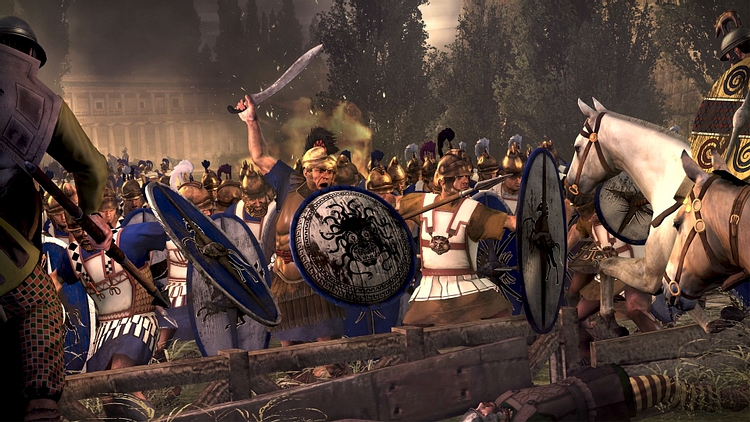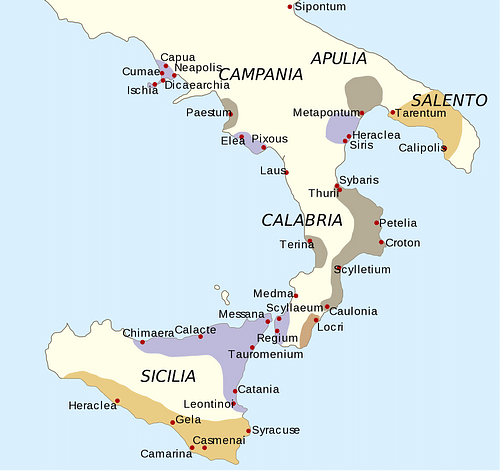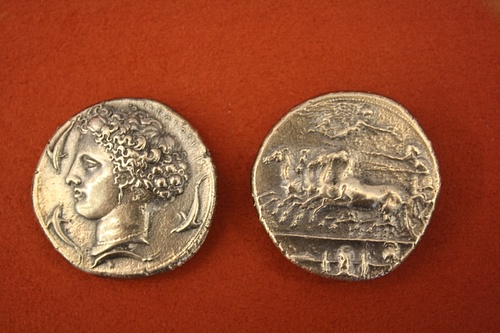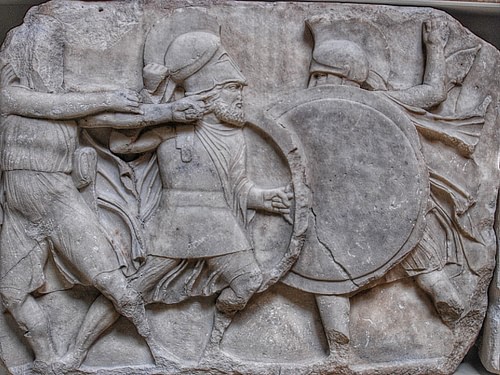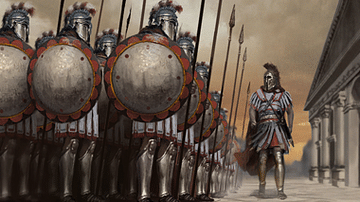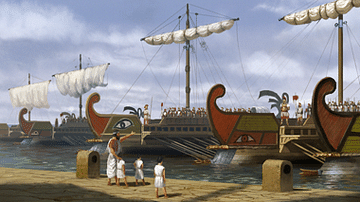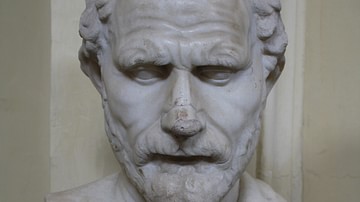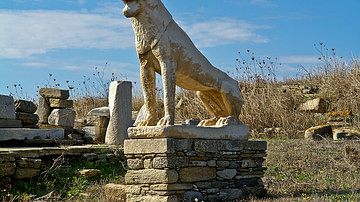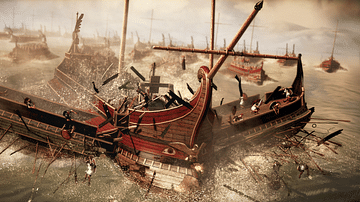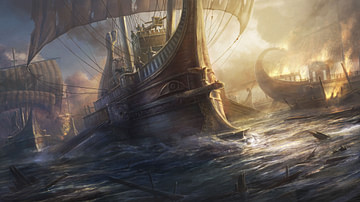
Nicias, or Nikias (c. 470-413 BCE), was a wealthy Athenian politician and general during the Peloponnesian War (431-404 BCE). He became established as a prominent political leader of the aristocratic faction in Athenian politics and generally recommended a cautious line in opposition to the more hawkish anti-Spartan attitudes of popular leaders such as Cleon and Alcibiades. After the death of Cleon (422 BCE), he negotiated the Peace of Nicias with Sparta, temporarily ending the Peloponnesian War. As a general he was known for his prudence, and he argued against launching the Sicilian Expedition. Nonetheless, he still joined the campaign when chosen as one of its generals. Despite the high risks involved, the campaign came close to success; however, when the tide turned against Athens, Nicias' indecision hindered the Athenian escape. Captured by the Syracusans, Nicias and his fellow general Demosthenes were executed.
EARLY LIFE
Nicias, the son of Niceratus, was descended from an aristocratic Athenian family. He was extremely wealthy, and Xenophon related that Nicias owned 1,000 slaves who were hired out for an obol a day each to work in the silver mines at Laurium (Ways and Means, 14). As a representative of the wealthy conservative faction, Nicias often came into conflict with Cleon. Unlike Pericles, who had won support from the masses "by virtue of his natural superiority and the force of his eloquence," Nicias "was exceptionally rich and used his wealth to win their favour" (Plutarch, Life of Nicias, 3). Plutarch was writing around 500 years after the death of Nicias, but he records that a statue of Athena and a shrine to Dionysus, paid for by Nicias, were still visible in his day. Nicias was well-known for his piety, and he sacrificed to the gods every day; however, his reliance on diviners would ultimately contribute to his downfall.
THE EARLY PELOPONNESIAN WAR
Nicias was frequently elected as a strategos, one of ten annually elected generals, during the 420s BCE. His combination of competence and caution ensured that his campaigns largely met with neither triumph nor disaster.
In 427 BCE, Nicias led an Athenian campaign against Minoa, an island close to Megara opposite Salamis. The Megarians had fortified the island and used it as a base from which to harass Athenian shipping. Nicias conquered the island within a few days and garrisoned it. The following year, he led a force of 60 ships and 2,000 hoplites against the island of Melos but failed to capture the island after devastating their land. His fleet then raided Theban and Locrian territory before returning to Athens.
In 425 BCE, Cleon attacked Nicias for his over-cautious approach and announced that Athens could capture Pylos from the Spartans if they only had more daring generals. Nicias then declined to lead the attack on Pylos and suggested that Cleon go instead. The assembly agreed and Cleon, with the assistance of Demosthenes, defeated and captured the Spartan force at Pylos. Nicias instead led another large fleet, this time containing 80 ships, against the territory of Corinth. The Athenians defeated a Corinthian army on land but then retreated to their ships as Corinthian reinforcements arrived. They then landed at and fortified a peninsular close to Epidaurus, before returning to Athens.
In 424 BCE, Nicias led his most significant campaign to date, commanding a fleet of 60 ships against the island of Cythera. Cythera lies just off the southern Peloponnesian coast and was an important Spartan trading post. After a brief campaign, Nicias captured Cythera, which then became a useful Athenian base for further raids against Spartan territory on the mainland.
THE PEACE OF Nicias
In 422 BCE, Cleon was killed by Brasidas, and Nicias argued that it was time to make peace with Sparta. With Brasidas also killed in the battle, the most influential pro-war voices on both sides were no longer a hindrance to the peace-makers. According to Thucydides, Nicias' motives were largely selfish. Nicias;
While still happy and honoured, wished to secure his good fortune, to obtain a present release from trouble for himself and his countrymen, and hand down to posterity a name as an ever successful statesman, and thought the way to do this was to keep out of danger and commit himself as little as possible to fortune. (The Peloponnesian War, 5.18)
A peace agreement was reached in the spring of 421 BCE, and it was agreed that each side would give back most of its conquests and all of its prisoners. However, key Spartan allies such as Corinth and Thebes rejected the agreement, as did the cities in northern Greece which had recently revolted from the Athenian Empire. Sparta and Athens then formed an alliance; however, their mutual suspicion was not dispelled. Although they did not directly attack each other for the next six years, Thucydides reports that the "unstable armistice did not prevent either party doing the other serious injury" (The Peloponnesian War, 5.25).
Alcibiades opposed the Peace of Nicias and attempted to restart the Peloponnesian War in the years following its ratification. This led to an increasingly bitter rivalry with Nicias. In an attempt to resolve the political feuding, it was decided to hold a vote of ostracism, following which it was expected that either Alcibiades or Nicias would be banished for ten years, during which their opponent would have a chance to steer Athenian policy. However, Alcibiades and Nicias joined forces and ensured instead that the demagogue Hyperbolus was ostracised (this was the last time that the institution of ostracism was used at Athens).
DEBATES OVER THE SICILIAN EXPEDITION
In 416 BCE, ambassadors arrived in Athens from Egesta, a polis in the west of Sicily. Egesta had been at war with the neighbouring polis of Selinus, but Selinus had allied with Syracuse, the most powerful Greek state in Sicily. Since Egesta had made an alliance with Athens a decade earlier, they now called upon the Athenians to protect them from Syracuse. They also claimed that such a war would benefit the Athenians. The peace with Sparta was already beginning to unravel and Syracuse, like Sparta, was inhabited by Dorian Greeks. The Egestans argued that Syracuse would help the Spartans against Athens once they had conquered Sicily. Athenian agents were sent to Egesta to assess the situation, and returned in early 415 BCE with 60 talents of silver from the Egestans (enough to fund a fleet of 60 ships for one month) and a report on the situation that was "as attractive as it was untrue" (Thucydides, The Peloponnesian War, 6.8). Based upon this misleading report, which grossly exaggerated the local support Athens would receive in Sicily, the Athenians voted to send a fleet and army to support Egesta against Syracuse, to be led by Alcibiades, Nicias and Lamachus.
Five days later, a second assembly meeting was held to decide on the practicalities of equipping the fleet. Nicias now attempted to persuade the Athenians to call off the expedition. He contended that sending a fleet to fight a new enemy in Sicily would be foolhardy when Athens already had dangerous enemies ready to attack them closer to home. In addition, the conquest of Sicily would be much more difficult to achieve than the Egestan ambassadors had led them to believe and, even if it could be conquered, it was too far away to hold securely in the long-run. Against Nicias, Alcibiades argued that Sicily was disunited and weak; and after being easily conquered by Athens it would be a springboard from which to conquer Carthage and then the whole Mediterranean. At the very worst, Athens' naval supremacy would mean that Sparta would remain unable to damage Athens at home and the fleet and army could be recalled at any time if they got into difficulties in Sicily. He also maintained that the only way to retain the Athenian empire was to expand it: if they ever sat still, as Nicias recommended, their forces would decay.
Nicias made one final effort to persuade the assembly to call off the expedition. This time he changed tactics. Instead of arguing that Syracuse could not be defeated, he argued that the task could only be achieved with a huge land and sea force. If his hope was that the Athenians would be put off by the costs he outlined, his plan backfired spectacularly. The assembly decided that if even the famously cautious Nicias believed that the conquest of Sicily was possible, then it must be so.
THE SICILIAN EXPEDITION
The expedition was despatched later in 415 BCE. According to Thucydides, the Athenian force was the largest ever launched by a Greek city. The Athenians sent 100 triremes, which were supported by 50 ships from Lesbos and Chios, as well as other ships from smaller allied cities (The Peloponnesian War, 6.31). Upon reaching Sicily, Lamachus favoured an immediate, direct attack on Syracuse. Alcibiades instead wanted to pursue a less risky but still active strategy of attacking Syracusan possessions and building an alliance of other Sicilian cities against Syracuse. In contrast, Nicias wanted to maintain a wait-and-see policy which involved the Athenians demonstrating their strength by sailing around Sicily but keeping most of their forces in their base at Catana, on the east of the island, north of Syracuse. When Alcibiades was recalled to Athens to face charges relating to the desecration of the Herms, which had taken place as the expedition was being prepared, Nicias became the undisputed leader of the campaign and his policy was the one adopted by the Athenians.
Nicias sent a letter to Athens requesting that he should be relieved of the command due to ill health and that the Athenian force should either be recalled or reinforced. The Athenian assembly refused to recall Nicias but decided to send reinforcements under the command of Demosthenes. Upon his arrival in 413 BCE, Demosthenes argued that the Athenians should launch an immediate attack on the Syracusans and either conquer the city or return to Athens if they were defeated. Nicias opposed the plan, but the army sided with Demosthenes. The battle was lost and so Demosthenes argued for a complete withdrawal. However, Nicias then refused to retreat. According to Plutarch, this was due to fear of what the Athenian assembly would do to him if he returned to Athens without gaining anything significant.
DEFEAT AT SYRACUSE
As the Syracusans received reinforcements from their allies, the Athenian position worsened and Nicias finally decided to end the siege. However, an eclipse of the moon occurred just as the Athenians were about to withdraw. The superstitious Nicias was convinced that this was a warning from the gods and insisted that the army wait a further month before retreating. During this month, Nicias became increasingly "oblivious of his other duties and completely absorbed in sacrifice and divination" (Plutarch, Life of Nicias, 24). Whilst the Athenians waited for the order to leave, the Syracusans continued to grow stronger and more confident. They began attacking the Athenian ships and blocked up the harbour mouth. Instead of retreating by land, Nicias launched the entire Athenian fleet in a last ditch effort to break the blockade and escape by sea. In the closely packed harbour, the superior Athenian seamanship counted for nothing and the Syracusans eventually won a hard-fought battle.
After losing their last hope of escaping by sea, a retreat by land was the only option. The best chance for success would have been an immediate retreat while the Syracusans were still celebrating their victory in the harbour. However, Nicias dithered yet again and was fooled by a Syracusan messenger into thinking that the Syracusans had prepared an ambush. While the Athenians delayed, the Syracusans sent their cavalry ahead to patrol the open ground and block off potential escape routes. During the eventual retreat southwards, the opposite direction from their sanctuary in Catana, the remnants of the Athenian army split into two groups led by Demosthenes and Nicias. Demosthenes' group was surrounded first and surrendered, but Nicias' force continued their retreat under heavy missile fire. Eventually, the remaining Athenians were attacked as they crossed the river Asinarus, and Nicias surrendered to Gyllipus.
Gyllipus wanted to take Nicias and Demosthenes back to Sparta as prisoners, but they were instead killed by the Syracusans. The other Athenian prisoners were enslaved and forced to work in the high-mortality Sicilian salt mines. According to Plutarch, the Syracusans were so fond of the Athenian playwright Euripides that any Athenian prisoners who could recite his lines managed to win more lenient treatment.
LEGACY
Besides his influential role in the Peloponnesian War, Nicias also appeared as a character in Plato's philosophical dialogue, the Laches. In the dialogue, two friends have asked Nicias and Laches for advice on whether to train their sons in armoured fighting. Nicias says that they should, but Laches is against the idea. Socrates is then brought in to decide the matter, and the question evolves into a debate about the meaning of courage. Laches equates courage with perseverance, but this definition is found wanting. Nicias instead argues that courage is "the knowledge of what's threatening and what's reassuring in warfare and in all other situations" (Plato, Laches 194e). This sounds more promising, and in the equation of virtue and knowledge one might have expected Socrates to agree. However, Socrates argues that such knowledge must be the basis of all virtue, not just courage, and so the attempt to define courage ends in failure. The two generals were perhaps chosen as representatives of the military arts because they eventually ended their careers in defeat (Laches died at the Battle of Mantinea in 418 BCE). Thus, their failure to understand the true meaning of courage is ultimately connected with their failure as generals.
In Plutarch's biography of Nicias, he showed respect for Nicias' piety but described his nature as "timid and inclined towards defeatism" (Life of Nicias, 2). It is likely that Thucydides knew Nicias reasonably well since they moved in the same aristocratic circles and, until Thucydides' own failure at Amphipolis, they were fellow Athenian generals in the early years of the Peloponnesian War. In addition, Thucydides' relative, Thucydides the son of Melesias, had played the same role in the 440s BCE as Nicias played from the 420s until his death: leader of the conservative faction in the Athenian assembly. Like Plutarch, Thucydides did not shy away from the fact that Nicias' personal qualities contributed significantly to the Athenian disaster in Sicily. Nevertheless, while discussing his pitiful end in Sicily, Thucydides lamented that Nicias, "of all the Hellenes in my time, least deserved such a fate, seeing that the whole course of his life had been regulated with strict attention to virtue" (The Peloponnesian War, 7.86).
Putting aside his piety and virtue, Nicias was a competent if occasionally over-cautious general. He had enjoyed a successful if not outstanding military career before the Sicilian Expedition and, as a proponent of peace with Sparta, he had consistently opposed the war that would eventually destroy the Athenian Empire. Likewise, he was a firm adversary of the Sicilian Expedition, which caused such damage to Athens. So a case can be made that Nicias was the victim of an overly aggressive and expansive democratic assembly. His tragedy was that he dutifully took part in a reckless campaign which he suspected all along would end in disaster. There is certainly some truth in this position; however, it should also be remembered just how close the Athenians came to achieving victory in Sicily. Syracuse was on the point of surrender before Gyllipus arrived, so a more assertive Athenian strategy in the early stages of the campaign might have transformed the outcome. Later on, when it was clear that an Athenian victory was no longer possible, a more decisive general could still have saved the Athenian fleet and army by ordering a retreat before the Syracusans were able to blockade the harbour. The result would have been an embarrassment for Athens, but nothing close to the eventual catastrophe produced by Nicias' relentless hesitation.

